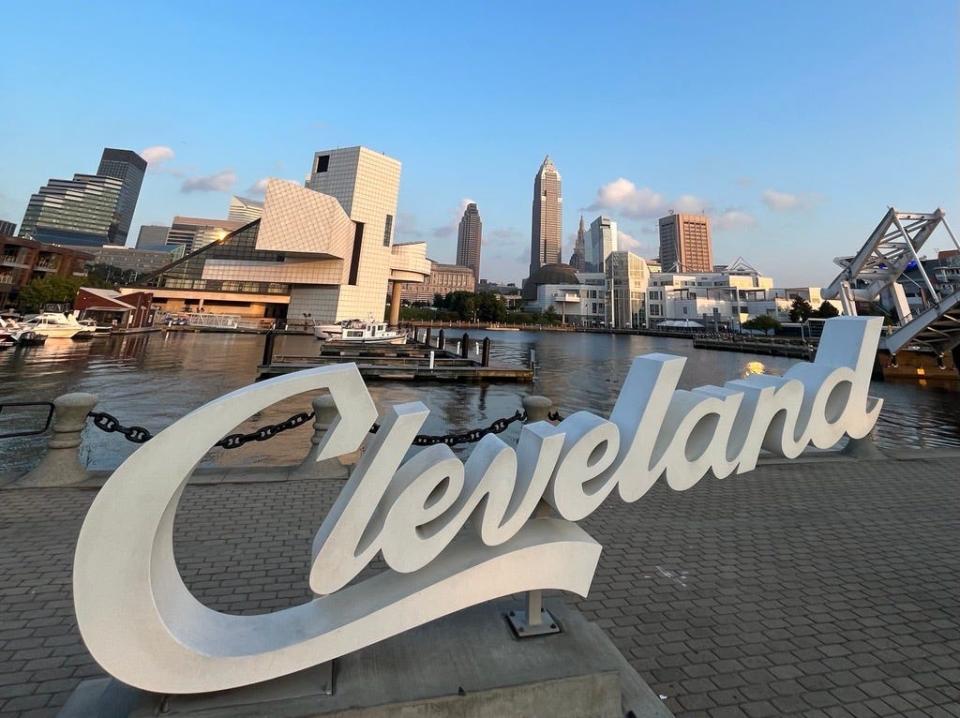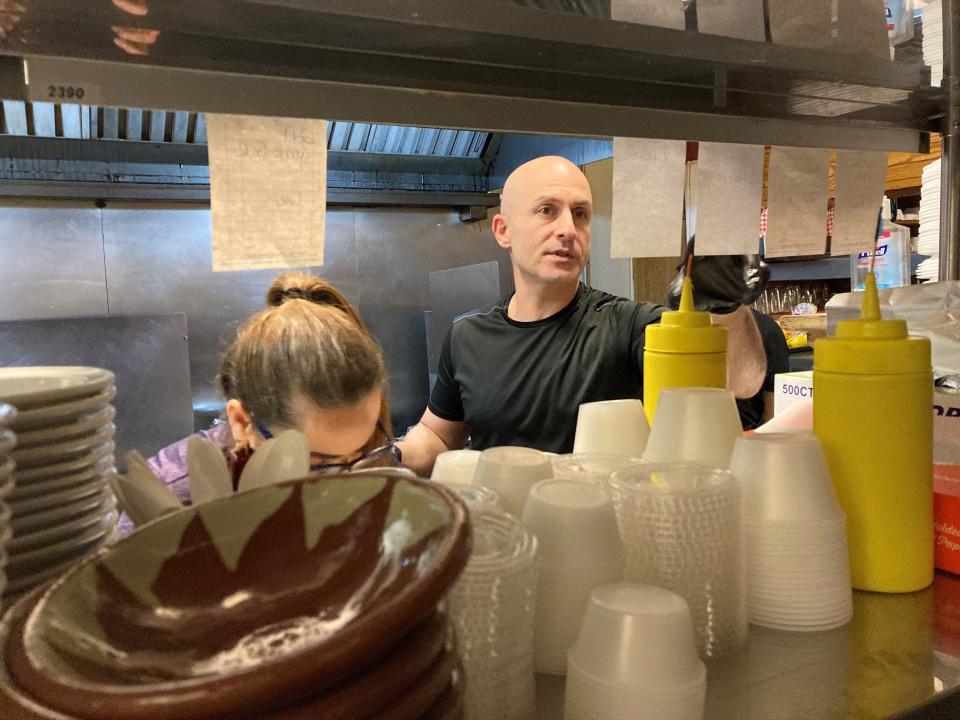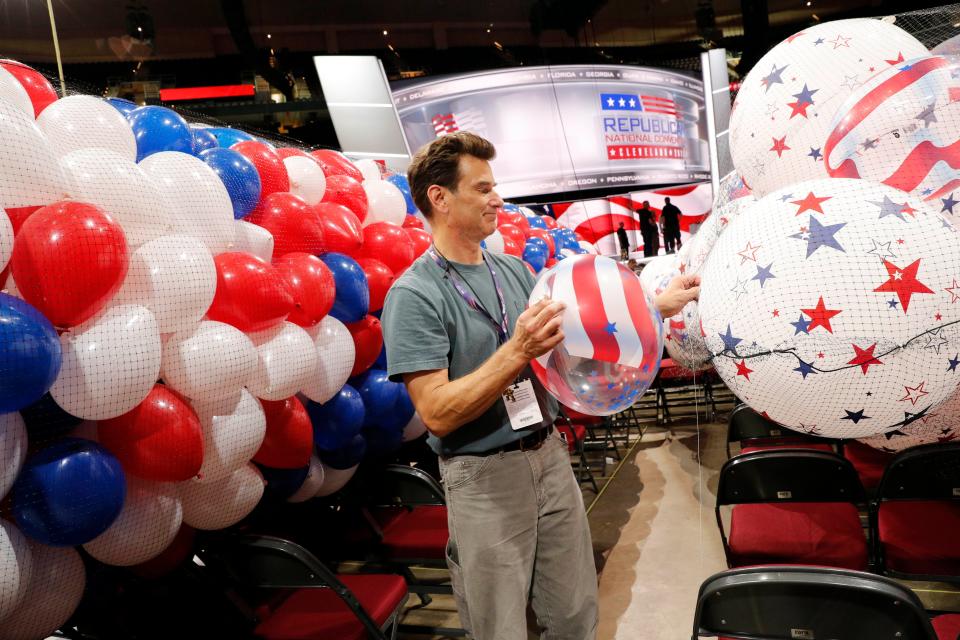What Milwaukee can learn from Cleveland, the last city to host a full-scale Republican National Convention
CLEVELAND — The experience of another Great Lakes city that hosted the Republican National Convention shows it might be helpful for Milwaukee businesses to temper expectations, realizing that some local businesses will prosper, while others might lose out.
Eight years ago, the last time the Republican National Convention was held in-person, Cleveland hosted the more than 40,000 delegates, politicians, journalists and others who descended on the city for the quadrennial event. Milwaukee hosts the convention July 15-18 at Fiserv Forum.
As in Milwaukee, Cleveland leaders promoted the convention as an opportunity to showcase what the city had to offer and to boost the region's economy.
Ultimately, the 2016 convention was declared a success that boosted tax and business revenue, shined a positive spotlight on the city and was devoid of the widespread violence that some had predicted.

"People still talk about it, and they talk about it in glowing terms," said David Gilbert, who led the Cleveland host committee and is head of Destination Cleveland, a publicly funded nonprofit that promotes Cleveland as a travel destination.
Cleveland RNC didn't always meet expectations
But the event did not live up to everyone's expectations.
Cleveland businesses near the convention site, then called the Quicken Loans Arena, but not close enough to draw its visitors, saw a drop in business during the four-day convention, largely attributed to locals staying away and convention goers not venturing outside of the security zone.
"There was this fever and this huge expectation in Cleveland that this was going to bring huge economic benefit, that all these businesses in surrounding areas were going to boom,” said Cleveland City Councilman Kerry McCormack, whose district includes parts of downtown and Cleveland's nearby Ohio City neighborhood.
“That did not pan out.”

Some advise tempering expectations of the RNC's impact
In Cleveland, the convention was sold as a major economic driver that would bring around $200 million into the regional economy. Not all businesses felt that impact.
"Looking back, I think that would have been smart for us to limit our expectations as a city," McCormack said.
Researchers who study the economic impact of mass events like national political conventions have argued their impact often is overstated and far from the economic windfall that convention backers claim. Milwaukee officials have claimed the RNC could generate up to $200 million in economic impact for the region.
While studies found higher hotel revenues and influxes of overnight visitors as a result of conventions, they also noted that convention-related disruptions from crowds, protests and heightened security interrupt normal business and likely "crowd out" shoppers and diners who otherwise would spend money out. Researchers also noted that political conventions are subject to "large leakages," in which spending does not stay in the local economy but goes elsewhere, for example to corporate hotel chains or their stockholders.
In Cleveland, businesses that likely got the most out of the convention were those that rented out space for private events or were closest to the convention arena, as well as hotels. They also included businesses officially hired by the Republican party to provide flowers, catering and other services.
Many of the restaurants and bars on downtown Cleveland's East Fourth Street, near the arena, were rented out by national media companies or by others for private events, Cleveland.com reported.

Businesses not close – or far – enough from the RNC at risk of losing out
Businesses that lost out included ones in Cleveland's Ohio City, an otherwise bustling neighborhood that became a "ghost town" during the convention, according to McCormack and business owners.
"It was completely dead. There was nobody out and about," said Ghassan Maalouf, owner of Nate's Deli, a restaurant in Ohio City that serves Mediterranean food. "This was supposed to be a huge boon, and it turned out to be nothing."
A hub for dining and drinking, the neighborhood is just across the Cuyahoga River from Cleveland's downtown, and could be likened to Milwaukee's Third Ward. About a mile and a half from the arena, Ohio City is home to Cleveland's public market, called the West Side Market. Centered on West 25th Street, the neighborhood also has bars, breweries and popular restaurants, such as Amba, which serves Indian-inspired small plates.
Looking back, McCormack said more could have been done to ensure businesses like those in Ohio City — far enough from the arena that convention goers didn't show up, but close enough that regulars stayed away — succeeded while the convention was in town.
"How do you reassure your regulars, 'It's okay. Come to this area as you normally would,' " said McCormack, speaking to the Milwaukee Journal Sentinel from a sunny, all-day cafe in Ohio City.
McCormack said it's important to be clear and intentional in messaging about traffic, road closures and other effects of the convention so local residents may go about their everyday lives as much as possible, and so disruptions to local business are minimal.
"Maybe some people for philosophical reasons don't want to go down, but you can't help that. That is what it is," he said. "I would just say, for the areas that are enough outside of the core, remove barriers in people's minds to be able to access those areas."

For some, RNC can prove an opportunity
Convention backers in Cleveland say Milwaukee businesses should look at the RNC as a business opportunity and take advantage of it.
"It's not about red or blue. It's about green," said Gilbert, the Destination Cleveland head.
Gilbert said he and the host committee in Cleveland encouraged businesses to remain open during the four-day convention and not close over concerns about road closures, protests or security hassles.
"If we have all these people here, we don't want them to see dead streets. We want them to see what Cleveland's really like," he said.
In Milwaukee, at least one business plans to avoid the convention entirely.
The Bay View bar Mothership announced it would close for the four-day convention.
"I'm not trying to get involved with or actively take money or rent the space out to that tomfoolery," a post on the Mothership's Instagram and Facebook pages read last month.
Owner Ricky Ramirez told the Journal Sentinel he didn't want to "throw a party for either side" — Democrat or Republican.
RNC a chance to tell good stories about Milwaukee
With a media spotlight on the convention, the RNC becomes an opportunity to tell positive stories about your city, Gilbert said.
It's a tactic Cleveland used, and that Milwaukee is embracing.
The key is to be proactive and to make it easy for media outlets to cover the city and all it has to offer, he said.
"It really is about taking advantage of what this brings to you. Don't look at it as just, 'We're going to fill a lot of hotel rooms,' " he said. "What groups are coming to town that you want to see Milwaukee differently?"
Even for businesses that didn't see the big returns promised by the convention, they still thought the convention was good for the city.
"It's always good to try to highlight your city," said Maalouf, the owner of Nate's Deli in Ohio City. "You're in the press constantly when that kind of things happens, and it just opens up people's eyes to, 'Oh, here's another city we can go visit.' "
Reporters Drake Bentley, David Clarey and Tom Daykin, of the Journal Sentinel staff, contributed to this story.
This article originally appeared on Milwaukee Journal Sentinel: What can Milwaukee learn from Cleveland, the last host of the RNC?
